Wallabies rugby latest news, fixtures: the World Cup change rugby union needs
International rugby is stuck in purgatory because of needless rule tweaks - but there’s only one change needed to revive the game they play in heaven, writes JULIAN LINDEN.

Wallabies
Don't miss out on the headlines from Wallabies. Followed categories will be added to My News.
It has taken a once in a century crisis but finally world rugby’s clueless administrators have figured out what every true-blooded fan of the sport already knows.
Rugby’s biggest success story over the last three decades has been the creation and spectacular growth of the World Cup, which has risen from humble beginnings to become the third-biggest sports event on the planet.
But it’s a sporting behemoth that has been woefully under-utilised, left to gather dust in the four years between each tournament, while the gap between the sport’s haves and haves-not continues to widen.
Kayo is your ticket to the best local and international sport streaming Live & On-Demand. New to Kayo? Try 14-days free now >
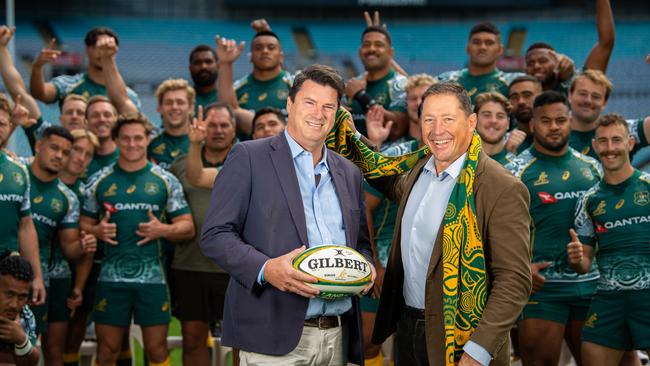
Finally, thanks to the pandemic and the lead taken by other, more progressive sports, rugby’s out of touch blazers have acknowledged the time has come to start staging the event every two years.
Long overdue, it’s the best idea World Rugby’s bumbling bureaucrats have come up with since they reluctantly agreed to stage the inaugural event in 1987.
And it can’t happen soon enough with the international game in complete disarray because of the pandemic and squabbling between countries only looking out for themselves.
There’s nothing wrong with the game they play in heaven.
The problem is it’s stuck in purgatory because woke officials have been sidetracked worrying about needless rule changes that drive fans mad instead of focusing on trying to properly grow the game.
Rugby will never reach its full potential until it makes the smart calls that other sports have already made instead of always bowing to the loudest voices in the room, who claim to have the game’s best interests at heart but are either too shortsighted or too self-interested to change with the times.
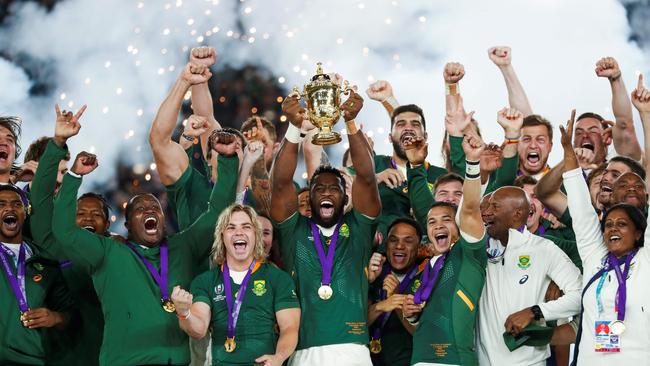
Conservative thinking is rugby’s biggest enemy.
That’s why the idea of a global league to help developing nations never got off the ground and why the international calendar features the same teams playing each other over and over again.
Agreeing to hold the sport’s jewel in the crown every two years should be the easiest decision every rugby playing nation in the world can agree on because everyone wins.
A phenomenal cash-cow that just keeps getting bigger and bigger, the RWC generates massive profits for both traditional and developing rugby-playing nations.
At the last tournament, in Japan in 2019, it generated an economic output of $8.1 billion, created 46,000 jobs, sold 99% of all tickets, which amounted to more than 1.7 million in total.
Fans all over the world can’t get enough of RWC, turning up in increasingly larger numbers. Japan attracted over 242,000 international visitors from 178 countries.
Every available ticket for the next tournament in France in 2023 has already sold out while Rugby Australia, which is going all-out to win the right to host the 2027 tournament, is forecasting record numbers and profits that it hopes will save the game from dying in this country.
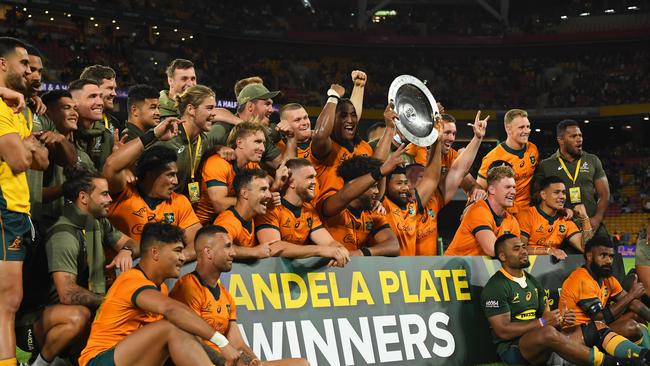
Sadly, but not surprisingly, the initial response from some of rugby’s traditional powers to the idea of a biennial RWC has been lukewarm.
Their argument is that it will kill the golden goose, but forgive them because they don’t know what they are talking about.
If there’s one lesson to be learnt from the pandemic, it’s that sports administrators need to think big and act bold.
And for rugby, that means taking the Rolls Royce out of the garage for more than a spin once every four years.
It’s commercial insanity to hold major sports events every four years in this day and age.
The antiquated idea dates back to ancient Greece but virtually every enlightened sporting body on the planet has already worked that one out.
Unless World Rugby acts soon, the game code could end being the last stubborn bastion to move into the 21st Century.
Even the Olympics, which implemented the four-year-cycle, are now held every two years — alternating between Summer and Winter Games — while soccer’s world governing body FIFA is preparing to move its World Cup to a two-year cycle.
It’s time rugby did the same.
Marika magic delivers Wallabies 10-year first
By Marco Monteverde
The Wallabies’ love affair with Brisbane continued on Saturday night, with Australia recording a 10th successive win at Suncorp Stadium by inflicting a second straight defeat on world champions South Africa.
Less than a week after beating the Springboks 28-26 on the Gold Coast, the Wallabies repeated the dose with a 30-17 bonus-point victory in front of almost 40,000 fans to win the Nelson Mandela Plate and keep their faint Rugby Championship hopes alive.
Braces to Len Ikitau and Marika Koroibete ensured the Wallabies scored four tries in a Test against South Africa for the first time since 2011.
Winger Koroibete’s tries in the 62nd and 68th minutes broke the game open after the Wallabies clung to an 18-17 lead.
Koroibete’s first try was set up by superb no-look pass from prop Taniela Tupou, who was superb in his 78 minutes on the field.
Fly half Quade Cooper again produced a controlled display in his second Test back after an absence of four years.
Skipper Michael Hooper, leading the Wallabies for a record 60th time, was a constant menace in another memorable display.

The Wallabies dominated early, making the most of the sin-binning of South Africa’s halfback Faf de Klerk to score two tries while the Springboks were reduced to 14 men.
De Klerk was shown the yellow card in the 13th minute for a professional foul on rival half Nic White.
Rather than take a shot for goal from the subsequent penalty, the Wallabies opted to kick for touch.
It paid dividends, with outside centre Ikitau scoring his first Wallabies try a minute later after breaking through the tackles of Springboks pair Handre Pollard and Marvin Orie.
Having kicked eight from eight the previous week to guide Australia to a 28-26 win over the same opponents, Cooper showed he was human after all, striking the post with a relatively easy shot for goal.
A Pollard penalty in the 18th minute cut the Wallabies lead to two points, but the hosts’ advantage was soon extended thanks to another try from the impressive Ikitau.
Cooper, fullback Tom Banks and Koroibete were all involved, with Ikitau scoring out wide to secure his brace.

Not fazed by his earlier miss, Cooper converted from the sideline to give Australia a 12-3 lead.
But the Springboks remained calm, with Australia’s momentum halted by a serious arm injury to Banks and the 33rd-minute sin-binning of flanker Lachie Swinton for high contact when making a tackle on South Africa’s No. 8 Duane Vermeulen.
By halftime the Wallabies’ lead had been cut to three points thanks to a perfect first-half goalkicking display from Pollard.
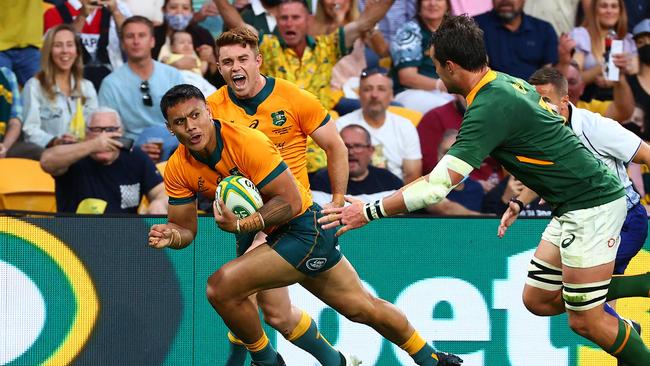
And with Swinton still off the field, South Africa took the lead early in the second half via a try from outside centre Lukhanyo Am, who was first to a deft grubber kick from de Klerk.
However, Australia regained the lead in the 51st minute through a Cooper penalty, before Koroibete’s two tries in the final 20 minutes sealed the hosts’ win.
South Africa finished the match with 14 men on the field after the late sin-binning of Jasper Wiese.
Wallabies coach Dave Rennie said performances such as Saturday night’s would help the team muster support from the Australian public.
“We want to get the country behind us and you’ve got to give them performances to make them proud of, and hopefully we’ve made a start on that,” Rennie said.
“It gives us belief. We’ve always felt the game that we’re trying to play is the right type of game for our group, and it’s great to get a couple of results.”
South Africa coach Jacques Jacques Nienaber said the Wallabies were “brilliant”.
“Sorry is all we can say,” Nienaber said.
“(It was) not a performance that was worthy enough for a Springbok jersey.”
CRAZY 5AM ROUTINE WHICH HAS COOPER WORLD CUP READY
Jamie Pandaram
Snubbed by the Wallabies, cut by the Queensland Reds, playing park footy — Quade Cooper couldn’t see it then, but now believes his rocky road to redemption has his body primed for the 2023 World Cup.
“If I had stayed the last five years and played every Test I guarantee my body would be smashed to pieces,” Cooper told News Corp.
“When you’re standing back there five years ago, you can’t look to where I am now and ride that. At that time I was disappointed and wishing I was playing.
“But I’m glad I was able to have people around me, and focus on my journey and the situation I was in.”
Australia’s saviour against world champions South Africa last weekend, 33-year-old Cooper is more philosopher than flick-pass merchant these days.
Kayo is your ticket to the best local and international sport streaming Live & On-Demand. New to Kayo? Try 14-days free now >
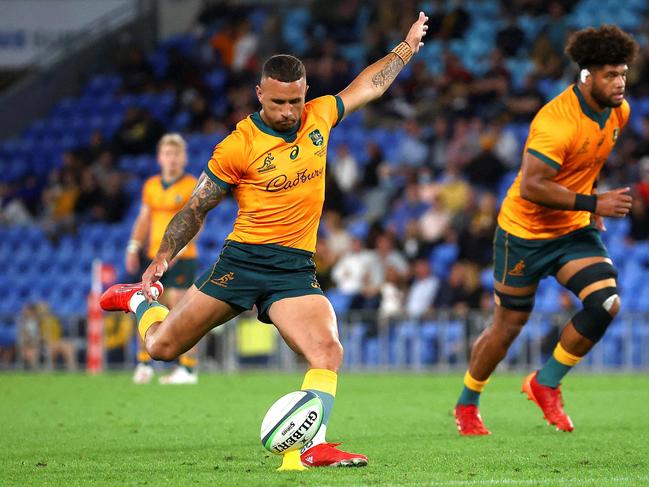
His stunning return to kick the winning goal against the Springboks after four years of Test match isolation was the culmination of radical lifestyle changes he undertook when told by Reds coach Brad Thorn not to bother returning for pre-season training in 2018.
He’d been in and out of the Wallabies side since 2011 and had last worn the gold jersey in 2017, yet when coach Dave Rennie called him out of the blue two months ago and Cooper was 14 weeks into his holiday, he knew he was ready to play at international level.
“The important thing for me being in the Wallabies team right now is that I was ready, because that is where I live my life,” said Cooper, whose weekly routine consists of several 5am training sessions even while on break from rugby duties.
“I was three-and-a-half months into my holiday when I got the call from Dave Rennie.
“But I live my life in a certain zone, a certain level, where I’m able to go in there and feel like I’m physically and mentally ready because I’m not knocking off.
“When I had the conversation with Dave, it was, ‘This is what my every day looks like, this is the level I live my life’.
“Why as rugby players do we look at the pre-season as starting at the bottom, then you bust yourself for eight weeks to prepare for the season opener and get into the best shape, and then taper off throughout the year?
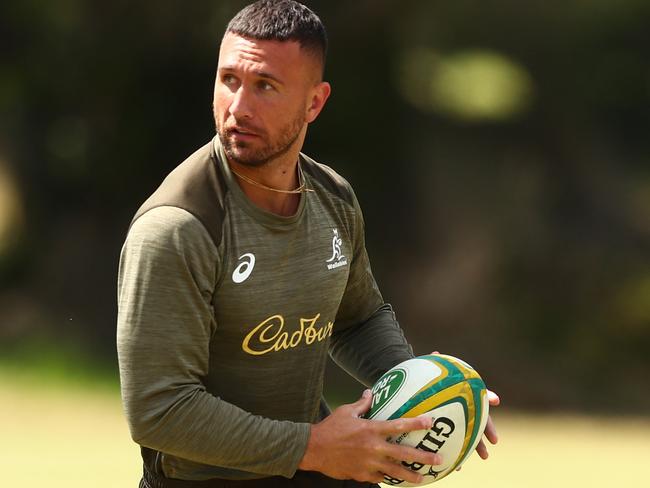
“That means you’re actually on the decline when you get to the most important part of your season, which is the finals.
“Why can’t we get to a point as players where your normal is that peak you get to at pre-season? If that’s your normal, and that’s where you live life, you’re not going to decline, you’re going to get better.
“That mental discipline and those good habits are built each day.
“I’m not a morning person, and when you’re on holiday you don’t have to do it, you can train at 3pm, 5pm, stay in bed all morning. The hard thing is to do something you don’t want to do.
“It also coincides with my little brother (Moses) being able to train with us he can go to work after, Tevita’s [Pangai Jr] little brother (Jermaine Pangai) being able to train with me so he can go to school after.
“I don’t have to do that, but that’s where it came from. I didn’t realise there was a book called The 5am Club, we just posted it as a laugh to each other calling ourselves The 5am Club.”
From 5am pull-ups to 10pm penalty kicks, the grind is now Cooper’s comfort zone.
This dedication, his return to the Test arena, and the blessing in disguise of missing four years of international rugby make him confident he can still be performing at his best come the next World Cup in France in two years.
“No one wants to be out of the team but over time, being able to look back with hindsight, I see what my body has been fortunate enough to be relieved of,” Cooper said.
“I was playing in 2018 in club football (for Souths in Brisbane). Think of the collisions you take in club football, and the demands of travel — the furthest game I played was down on the Gold Coast.
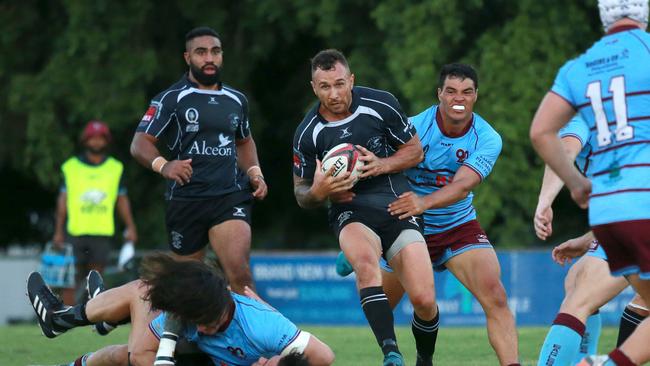
“So I’m able to have great routine, stay at my house, sleep in my bed, have great nutrition, for a whole year.
“I then played Super Rugby for a short time, one season, then I’m there in Japan.
“At the time, you’re thinking of the immediate challenge.
“My goal wasn’t to come back and play for Australia, what I was doing was trying to be the best version of myself within the circumstances I was placed.
“I was so focused on learning about my body, evolving, so I could provide for the team I was playing for; Souths, Melbourne, and Kintetsu Liners in Japan.
“That is still my focus of being able to grow, but also provide a great example for the guys around me so our team can be the best we can.
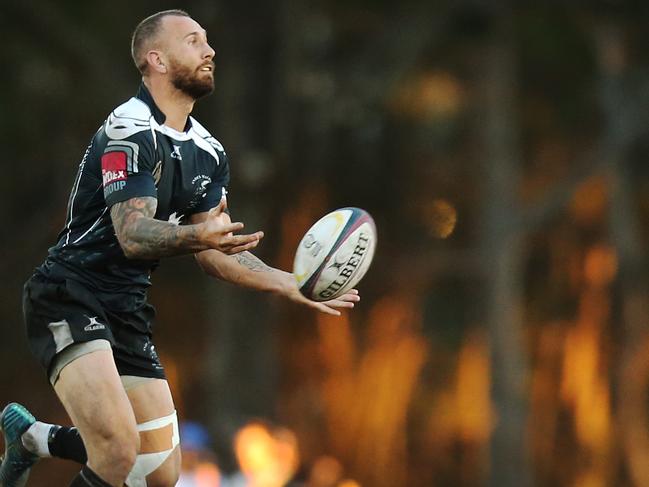
“When I look at my body, the work I put into it, is something I pride myself on every day, make it the best it can possibly be.
“The situation I’m in, I am so grateful for, because it has been able to protect my body.”
Once the player even Wallabies fans loved to hate, Cooper has managed turned the tide of public perception.
“I feel a lot of love from people every day, I’m fortunate to have gone through a certain journey, and I love being able to share bits of my journey with people,” he said.
“And also be an example for people who continue to stay in the fight, and work at being better each day.
“I’m so grateful to be in the position, to be where I am, to work with young guys like Noah [Lolesio] and see him face some of the challenges I had, to be able to see challenges that he’s going to face that I faced.
“I’m happy to be a soundboard for him, provide some information and experience to him but still let him make those decisions for himself.”
Cooper, mentored by All Blacks and NRL great Sonny Bill Williams, starts again in the No. 10 jersey against the Boks on Saturday at Suncorp Stadium.
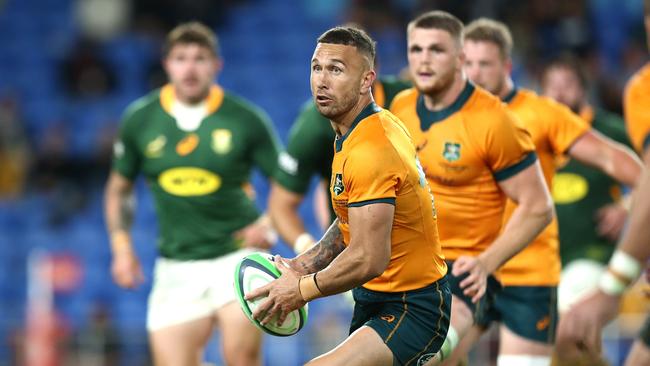
He does not view his career-best 23-point performance last Sunday as a defining moment.
“I’m seeing things for what they are; in the team, out of the team, the kick on the weekend to win the game, understanding it for what it is,” Cooper said.
“At the end of the day, this game we play, it’s a game of rugby.
“How you go about your everyday life is the most important thing. When you think back on moments like that, it’s a small moment in time, 80 minutes of a game, 30 seconds of a kick.
“You cannot define yourself on a moment. This for me is the biggest thing I’ve learnt.
“You go through ups, downs, highs, lows. You start to see things and appreciate things differently.
“When you have conversations with people, see things they’ve gone through, you start to question your own actions or your own life day-to-day.
“For me, I was getting injured a lot throughout the years. What was the level I was training at and looking after my body?
“It’s not a light bulb moment where you go ‘Boom, I’ve got to do this now’. You learn, you look to improve and grow.
“Rugby does not define me as a man and as a person. How I go about my everyday life, that’s where I see defining moments.
“I enjoy the challenge of each day. No day is the same, but you bring into those days your discipline, being strong in your habits each day.
“I can live with the outcome, whether it’s good or bad. I do my best every single time, it’s how I go about my day to day that really matters to me.”
Quade Cooper: the journey
Born: April 5, 1988 in Auckland. Moved to Tokoroa in 1989, raised by mother Ruhia and stepfather David Jones.
Move to Australia: Cooper and his family relocated in 2001 to Brisbane, where he won a scholarship to Anglican Church Grammar School.
Super debut: Aged 18, Cooper made his first Super Rugby appearance for Queensland in 2007 under coach Eddie Jones.

Turnaround: The Reds finished last and Jones resigned, but things didn’t improve greatly under replacement Phil Mooney. Cooper, charged with stealing two laptops in 2009 but mediated the issue away from the courts, was ready to leave the Reds, but in 2010 incoming coach Ewen McKenzie urged the playmaker to stay.
Premiership: In 2011, Cooper led Queensland to their first Super Rugby title punctuated by outrageous attacking plays including flick passes and chip kicks, culminating in the grand final win over the Crusaders.
Public enemy No. 1: The Bledisloe Cup series that same year saw Cooper become the most hated man in New Zealand after kneeing All Blacks captain Richie McCaw in the head. By the time he returned to his land of birth for the 2011 World Cup, Cooper was booed incessantly and had people wishing him harm during games. He kicked the ball out on the full to start the semi-final in Australia’s loss to the All Blacks, then tore his ACL in the third vs fourth match against Wales.

Toxic: Cooper then threw a grenade into Australian rugby by declaring there was a toxic environment in the Wallabies camp under coach Robbie Deans. He was fined $60,000 and didn’t played under Deans again, missing the 2013 British & Irish Lions series.
Boxing: Cooper made his professional boxing debut by knocking out Barry Dunnett in the first round. He’s since had two more wins against lacklustre opponents in 2014 and 2017.
Bonjour: After the 2015 World Cup where he played a second-fiddle role, Cooper joined French glamour club Toulon as a replacement for England legend Jonny Wilkinson. However, club owner Mourad Boudjellal was unflattering in his appraisal, saying: “It’s difficult to go from foie gras to pate. For no, Cooper is not what I was hoping for.”
Passport bungle: In 2016, Cooper joined the Australian Sevens team, but his dreams of competing at the Rio Olympics were quashed when he could not get an Australian passport, revealing he’d been travelling with a Kiwi passport since becoming a Wallaby.
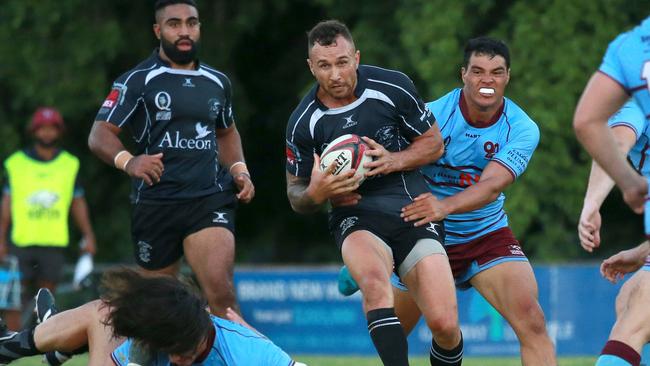
Thorny issue: Before the start of the 2018 Super season, new Reds coach Brad Thorn told Cooper he was his “fifth-choice” five-eighth, despite being on a club-high annual salary of $800,000. Instead of joining another club, Cooper opted to join Brisbane club team Souths, forcing the Reds to pay his entire salary.
Cheika snub: Cooper was brought back into Wallabies camp by then coach Michael Cheika but wasn’t picked for the 2019 World Cup campaign. Cooper later revealed he’d argued with Cheika about working on aspects of his game the coach had asked but still hadn’t been picked.
Kintetsu: Cooper joined his great mate Will Genia at Kintetsu Liners in Japan’s Top League at the end of 2019.
Miracle return: Four years after last wearing the Wallabies jersey, Cooper was selected by coach Dave Rennie against the Springboks on September 12, 2021, and kicked the matchwinning penalty after the siren.
Originally published as Wallabies rugby latest news, fixtures: the World Cup change rugby union needs



